牛津译林版(2019)选择性必修 第一册Unit 4 Exploring poetry>Extended reading课件(共55张PPT)
文档属性
| 名称 | 牛津译林版(2019)选择性必修 第一册Unit 4 Exploring poetry>Extended reading课件(共55张PPT) |
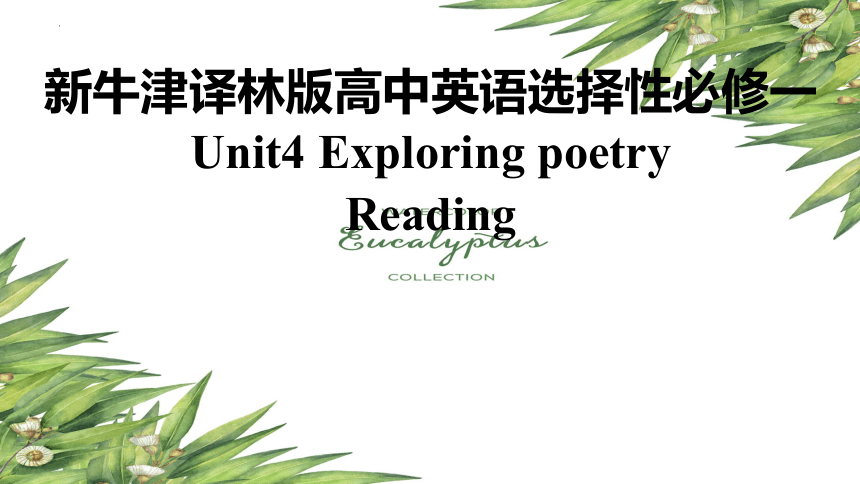
|
|
| 格式 | pptx | ||
| 文件大小 | 42.3MB | ||
| 资源类型 | 教案 | ||
| 版本资源 | 牛津译林版(2019) | ||
| 科目 | 英语 | ||
| 更新时间 | 2023-06-08 00:00:00 | ||
图片预览

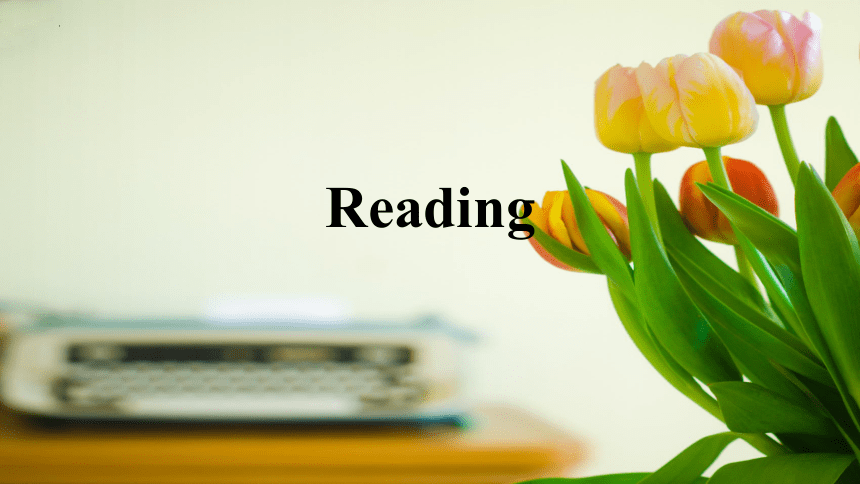
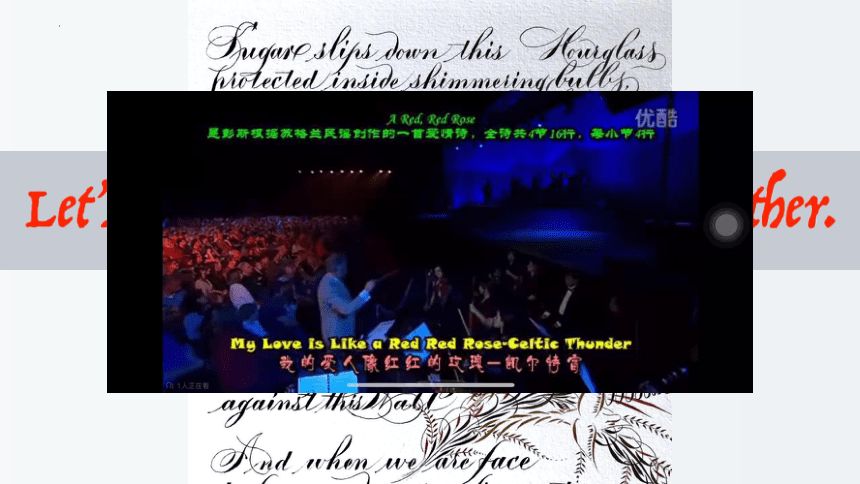
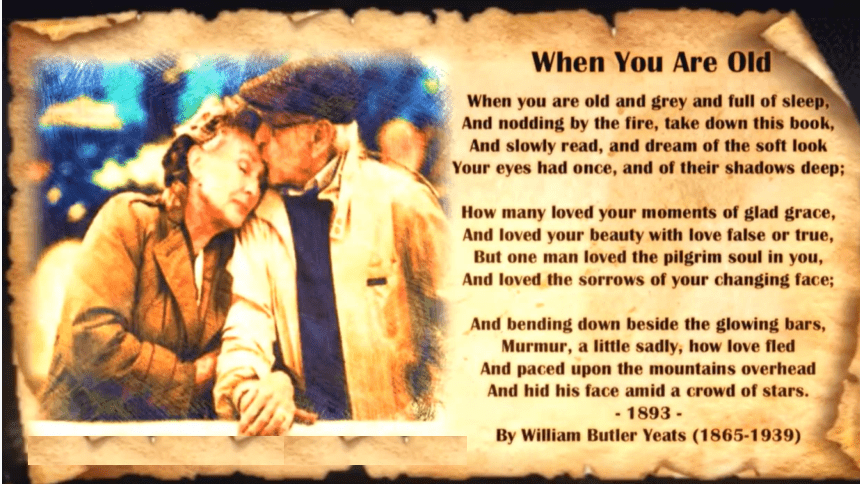
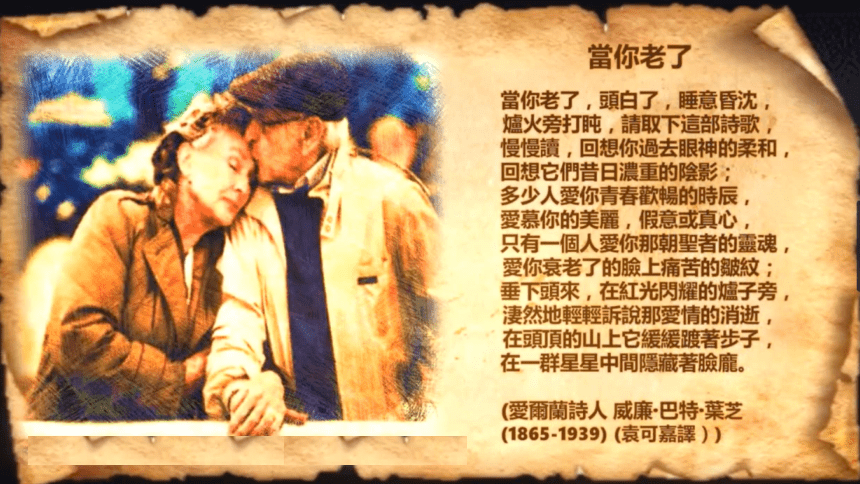
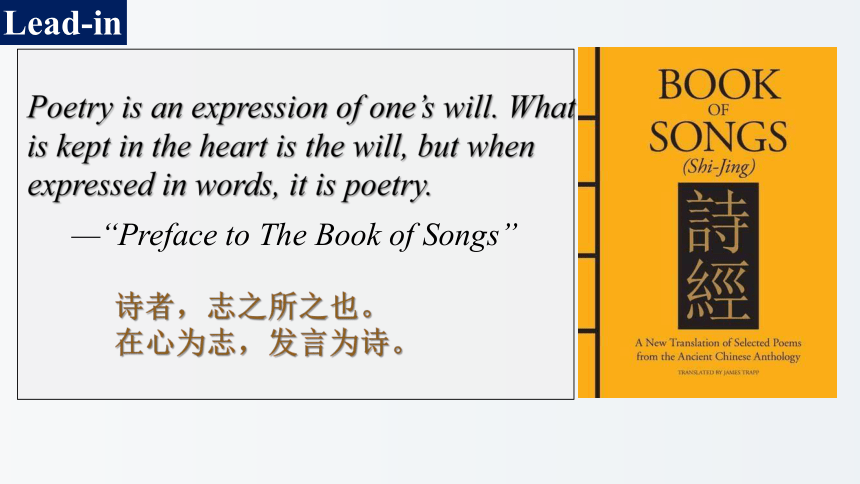
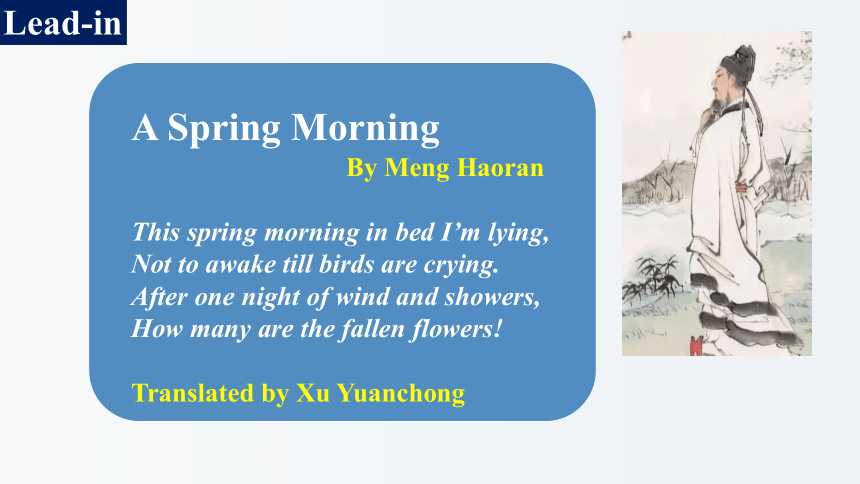
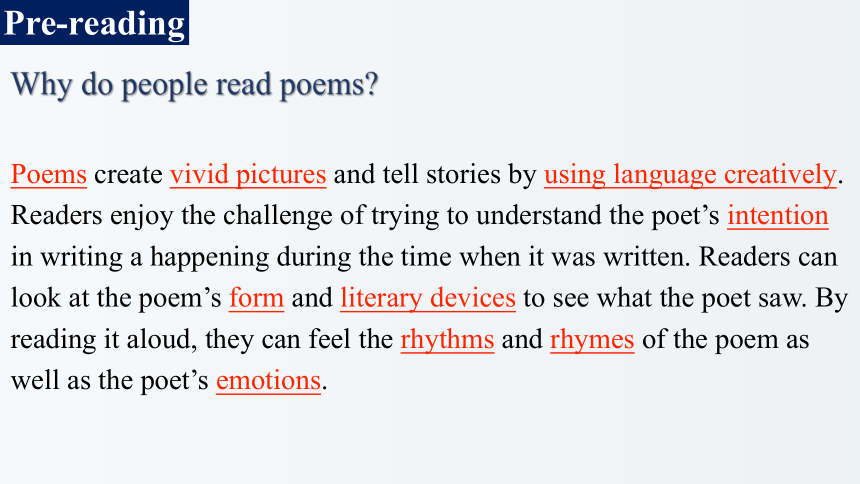
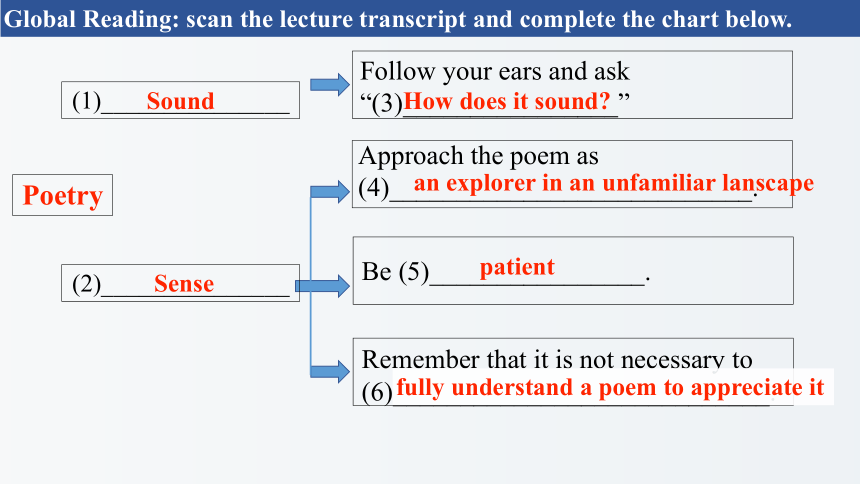
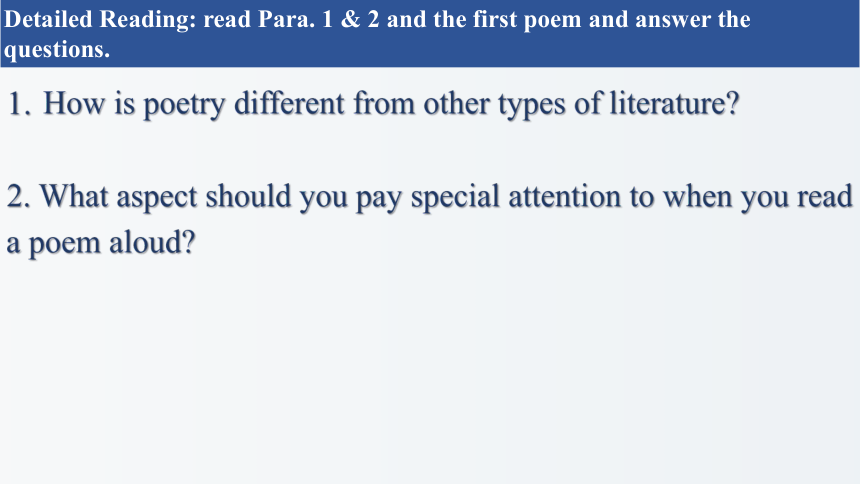
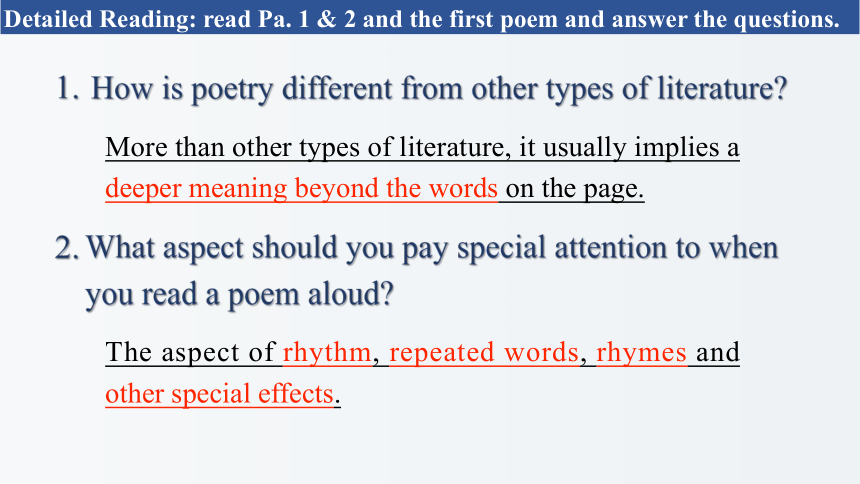
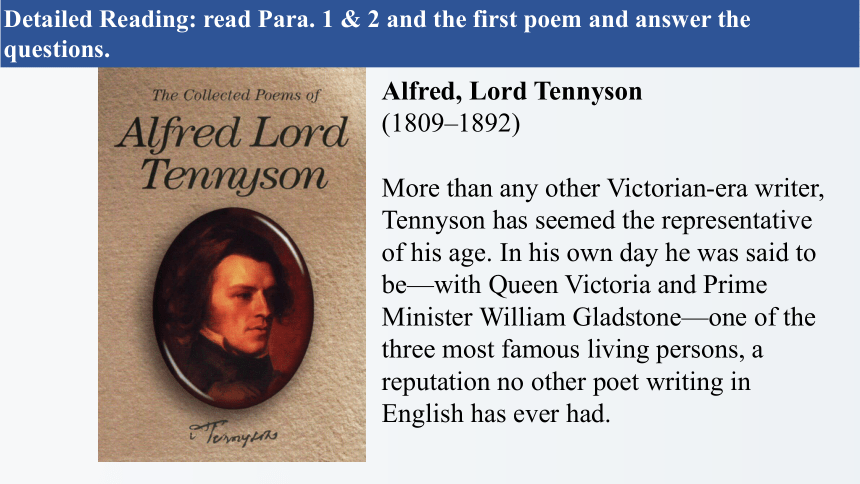
文档简介
(共55张PPT)
新牛津译林版高中英语选择性必修一Unit4 Exploring poetry
Reading
Reading
Lead-in
Poetry is an expression of one’s will. What is kept in the heart is the will, but when expressed in words, it is poetry.
—“Preface to The Book of Songs”
诗者,志之所之也。
在心为志,发言为诗。
A Spring Morning
By Meng Haoran
This spring morning in bed I’m lying,
Not to awake till birds are crying.
After one night of wind and showers,
How many are the fallen flowers!
Translated by Xu Yuanchong
Lead-in
Why do people read poems
Poems create vivid pictures and tell stories by using language creatively. Readers enjoy the challenge of trying to understand the poet’s intention in writing a happening during the time when it was written. Readers can look at the poem’s form and literary devices to see what the poet saw. By reading it aloud, they can feel the rhythms and rhymes of the poem as well as the poet’s emotions.
Pre-reading
(1)_______________
Global Reading: scan the lecture transcript and complete the chart below.
Poetry
(2)_______________
Follow your ears and ask
“(3)________________”
Approach the poem as
(4)___________________________.
Be (5)________________.
Remember that it is not necessary to
(6)____________________________.
Sound
Sense
How does it sound
an explorer in an unfamiliar lanscape
patient
fully understand a poem to appreciate it
How is poetry different from other types of literature
2. What aspect should you pay special attention to when you read a poem aloud
Detailed Reading: read Para. 1 & 2 and the first poem and answer the questions.
How is poetry different from other types of literature
More than other types of literature, it usually implies a deeper meaning beyond the words on the page.
What aspect should you pay special attention to when you read a poem aloud
The aspect of rhythm, repeated words, rhymes and other special effects.
Detailed Reading: read Pa. 1 & 2 and the first poem and answer the questions.
Detailed Reading: read Para. 1 & 2 and the first poem and answer the questions.
Alfred, Lord Tennyson
(1809–1892)
More than any other Victorian-era writer, Tennyson has seemed the representative of his age. In his own day he was said to be—with Queen Victoria and Prime Minister William Gladstone—one of the three most famous living persons, a reputation no other poet writing in English has ever had.
Detailed Reading: read Pa. 1 & 2 and the first poem and answer the questions.
Sweet and low, sweet and low,
Wind of the western sea,
Low, low, breathe and blow,
Wind of the western sea.
Over the rolling waters go;
Come from the dying moon, and blow,
Blow him again to me,
While my little one, while my pretty one sleeps.
(From “Sweet and Low”
by Alfred Tennyson)
Detailed Reading: read Para. 3 and the second poem and finish the chart.
Approach the poem as if you were an _______ in an unfamiliar_________
As you approach the poem, you should ask:
As you explore the poem, you should ask:
As you slowly explore your surroundings, you will
explorer
landscape
Who is talking Who is being talked to What is being described Is there a sense of place Are there other people or objects there
What are the images
What happens when they are put together
start to ___________ that give you a greater _______________ of the poem.
dig up clues
understanding
What images come into your mind when reading it
Detailed Reading: read Para. 3 and the second poem and finish the chart.
What images come into your mind when reading it
When I read it, I can see in my mind the image of a bird in a cage, which is desperately singing for freedom.
Detailed Reading: read Para. 3 and the second poem and finish the chart.
An acclaimed American poet, storyteller, activist, and autobiographer, Angelou worked for Dr. Martin Luther King Jr. and was also an educator who served as a professor in the university.
Detailed Reading: read Para. 3 and the second poem and finish the chart.
The caged bird sings
with a fearful trill
of things unknown
but longed for still
and his tune is heard
on the distant hill
for the caged bird
sings of freedom.
(From “Caged Bird”
by Maya Angelou)
Detailed Reading: read Para. 3 and the second poem and finish the chart.
Detailed Reading: read Pa. 4-6 and the third poem and answer the questions.
What does the lecturer think of poems that are easy to understand
What should you do when you have difficulty in understanding a poem
According to the lecturer, what is more important in appreciating a poem
What is the function of the poem quoted after Para. 4
Detailed Reading: read Pa. 4-6 and the third poem and answer the questions.
What does the lecturer think of poems that are easy to understand
They are often less interesting than those that constantly reveal deeper and previously unrecognized meanings.
What should you do when you have difficulty in understanding a poem
We should set it aside and come back to it later. With our insight into life becoming deeper, we may one day find it not so hard to understand at all.
According to the lecturer, what is more important in appreciating a poem
Detailed Reading: read Pa. 4-6 and the third poem and answer the questions.
Poetry reading can make us feel something or let us perceive another level of meaning, which is more important and worth our effort.
What is the function of the poem quoted after Para. 4
This poem is not easy to understand and is suitable as an example to support the tip of “be patient when having trouble in understanding a poem”.
Detailed Reading: read Pa. 4-6 and the third poem and answer the questions.
Robert Frost (1874-1963) was an American poet who was much admired for his description of the rural life of New England, and his realistic verse portraying ordinary people in everyday situations. His famous poems include: Stopping by Woods on a Snowy Evening and The Road Not Taken.
Detailed Reading: read Pa. 4-6 and the third poem and answer the questions.
Whose woods these are I think I know.
His house is in the village though;
He will not see me stopping here
To watch his woods fill up with snow.
From “Stopping by Woods on a Snowy Evening” by Robert Frost
Post-reading
Please choose one of the poems in the lecture transcript and think about the sound and sense of the poem.
Please give some other tips on how to read a poem.
Post-reading
Please choose one of the poems in the lecture transcript and think about the sound and sense of the poem.
The poem by Maya Angelou describes the image of a caged bird wanting to be free. The lines are short and simple, which makes the message more direct and powerful. The short lines could also imply the sense of being in a small cage with very little space to fly around in. This does not stop the bird from singing though, and by repeating the sound of some words: “trill”, “still”, and “hill” I can imagine the sound that the bird makes it sings its lonely song. “Caged Bird” reminds me of the possibilities we have in life and that we should look past our current limitations.
Post-reading
Please give some other tips on how to read a poem.
From my point of understand a poem better, we should also know more about the poet and the background in which the poem was created — the theme of a poem usually has a close relationship with the background in which the poet wrote it.
Language Points
1. imply a deeper meaning beyond the words 隐含着超越字面更深层的涵义2. reveal this hidden dimension 揭示这个隐藏的方面3. appear to be beyond one’s grasp 似乎无法理解
4.see images in your mind 脑海里浮现出一些画面
5.explore your surroundings 探索你周围的环境
6.dig up clues 挖掘线索
7.struggle to interpret the meaning of the poem 纠结于理解这首诗
8.with much painstaking effort 下了很大的功夫
9. have some patience 有一点耐心 with patience 耐心地10. a lifelong job 一辈子的事11. set sth. aside 把......放在一边 set aside some time 留出一些时间12. go on a journey to a remote and unknown destination 踏上旅程,去一个遥远未知的目的地
13.abandon logical thinking 抛开逻辑思维
14.discover / uncover / unearth its true inner beauty 发现诗歌真正的内在美
15.as long as 只要
16.let you perceive another level of meaning 领悟到另一层含义
17.be worth your effort 值得你的努力
18.the everlasting beauty 追求永恒之美
19.take me to remote mountaintops covered with mist 把我带到被薄雾覆盖的遥远的山顶
20.out of place 不合适的,不恰当的,不在适当位置上
21.stick out 突出;坚持;醒目
22.dig up a treasure 挖掘宝藏
1. Frozen with snow.(p43)
frozen adj.结冰的,冰封的;冷冻的;冻僵的
→ freeze v.(使)冻结;冰冻
→ freezing adj.冰冻的;极冷的
be frozen with 吓呆,惊呆
She stared at him, frozen with shock.
2. More than any other type of literature, it usually implies a deeper meaning beyond the words on the page.(P44,L2)
imply vt. to suggest that something is true, without saying this directly ①含有…的意思;暗示;暗指
eg He is implying that l am wrong.
他的意思是我错了。
②vt. 意味(某事可能是真的)
eg The high level of radiation in the rocks implies that they are volcanic in origin.
这些岩石内部的高辐射水平意味着它们是由火山作用形成的。
3. So, how to reveal this hidden dimenson (P44,L3)
dimension n. 方面,侧面;规模,程度;维
a problem of considerable dimensions 一个涉及面相当广的问题
Her job added a new dimension to her life. 她的工作为她的生活增添了新的内容.
4. Even if its true meaning appears to be beyond your grasp, you can always say something about how the poem sounds when you read loud. (P44,L5)
grasp n. your ability to understand a complicated idea, situation, or subject ①理解,领会;
beyond one’s grasp 无法理解
eg This essay is beyond the grasp of an average high school student.
这篇散文是一般中学生不能理解的。
②抓紧,握紧,控制;
eg He had allowed the ball to slip from his grasp.
他让球从手里滑了出去。
③能力所及
eg An agreement to end the war seemed within their grasp.
签订协议结束战争似乎在他们的掌握之中。
vt. 抓紧;
eg Kay grasped him by the wrist.
Kay紧紧抓住他的手腕。
领会,理解
eg Some people find the idea of relativity difficult to grasp.
有些人觉得相对论的概念很难理解。
beyond the grasp of sb 为......所不能理解
within one’s grasp 能力所及
have a good grasp of 掌握得好
grasp the opportunity / chance to do ... 抓住机会......
【语境应用】翻译下面句子。
1) 有些人发现理解这个观点很难。
2) 她准备好抓住任何机会来扩大自己的生意。
3) 这个课程将提高学生们对这一语言的理解。
Some people find the idea (is) difficult to grasp. / Some people find it is difficult to grasp the idea.
She is ready to grasp any opportunity to expand her business.
The course will improve the students’ grasp of the language.
5. Do you detect a rhythm (P44,L7)
detect v. to notice or discover something, especially something that is not easy to see, hear etc 发现,查明,侦察出
eg Many forms of cancer can be cured if detected early.
【拓展】
detectable adj. 可觉察的;可发现的;可查出
detector n. 探测器,检测器
detective n. 侦探,警探
detection n. 察觉,发现; 侦察
6. This combination is often complex or even contradictory. (P45,L25)
contradictory adj.相互矛盾的,对立的
→ contradict vt.反驳;相矛盾
→ contradiction n.(事实、看法、行动等的)不一致,矛盾;反驳
We are faced with two apparently contradictory statements. 我们面前这两种说法显然是矛盾的。
The advice I received was often contradictory. 我所得到的建议常常是相互矛盾的。
7. As you slowly explore your surroundings, you will start to dig up clues that give you a greater understanding of the poem. (P45,L26)
dig up: to discover information about somebody/something ①发现,搜集,查明
eg They tried to dig up something from his past to spoil his chances of being elected.
他们试图从他的过去挖出些东西来破坏他当选的可能性。
The paparazzi love to dig up the scandals of famous people.
狗仔队热衷于打探名人的丑闻。
②掘起;挖掘出
eg An old Roman vase was dug up here last month.
上个月在此地出土了一个古罗马花瓶。
dig out 挖掘;发现,翻出 dig into 探查,探究,探寻
clue n. a fact or a piece of evidence that helps you discover the answer to a problem 线索,提示
eg Give me a clue. What does the word begin with
给我点提示。这个词是以什么开头的
I didn't have a clue as to this problem.
关于这个问题,我一无所知。
5. Third, if you are still struggling to interpret the meaning of a poem even with much painstaking effort, Just have some patience. (P45,L38)
interpret vt. to explain the meaning of something ①解释,阐释
eg Tom was asked to interpret the poem.
Tom被要求诠释那首诗的意义。
②把…理解为;领会 interpret sth (as sth) 把…理解为;领会
eg I didn't know whether to interpret her silence as acceptance or refusal.
我不知该把她的沉默看作是接受还是拒绝。
③演绎
eg If Shakespeare's plays are to reach a large audience they need to be interpreted in a modern style.
要使莎士比亚的戏剧得到广大观众的接受,就需要用现代的风格去演绎。
④vi. 口译
eg They spoke good Spanish and promised to interpret for me.
他们西班牙语说得很好,答应替我翻译。
→ interpreter n.口译员
→ interpretation n.解释;理解;演绎
patience n. the ability to stay calm and accept a delay or sth
annoying without complaining 耐心,忍耐力
eg I wouldn't have the patience to sit sewing all day.
我可没有耐心整天坐着缝缝补补。
【拓展】
patient adj. 有耐心的,能忍耐的
eg This teacher is very patient with young children.
这位老师对幼儿非常有耐心。
patient n. 病人
eg Doctors are very patient with patients.
医生对病人很有耐心。
【语境应用】翻译句子
1) 警方仍在寻找能帮助搜索失踪女孩的线索。
Police are still looking for _________ in their search for the missing girl.
2) 这份资料可以从多方面解读。
The data can be _____________________________________.
3) 我要把那棵植物挖出来,挪个地方。
I'll _________________and move it.
clues
interpreted in many different ways
dig up that plant
6. So if you do not get it, set the poem aside and come back to it later. (P45,L41)
set sth aside:set sth aside 把…放到一旁(或搁到一边);省出,留出(钱或时间);暂时不考虑(或放一放)
to not consider something, because other things are more important
Business is business. Let's set our personal feelings aside for now.公事公办。这会儿咱们就先把个人情感放一边吧。
She tries to set aside some money every month.
她每个月都尽量存点钱。
【语境应用】翻译下面句子。
1) Try to set aside some time each day for exercise.
2) He set his pen aside and read over what he had written.
尽量每天留出些时间锻炼。
他把钢笔搁到一边,将写的东西细读了一遍。
aside from = apart from 除了.....
put aside 撇开;把...放在一边,暂不考虑;储存…备用.
7. As an explorer, you will not reach your goal immediately— you need to go on journey to a remote and unknown destination. (P45,L42)
remote adj. far from towns or other places where people live ①偏远的,偏僻的
eg After two hours walk, they arrived at a remote mountain village.
走了两个小时之后,他们来到了一个偏僻的山村。
②遥远的;久远的
eg in the remote past / future 在遥远的过去/将来
③关系较远的;远亲的
eg a remote cousin 远房表亲
④相差很大的;极不相同的
eg His theories are somewhat remote from reality.
他的理论有点儿脱离现实。
⑤(机会或可能性)渺茫的,微乎其微的
eg There is still a remote chance that they will find her alive.
他们仍然有一线希望能把她活着找到。
8. This may seem difficult at first, but when you finally make your great discovery, your efforts will be rewarded.(P45,L44)
reward vt. to give something to someone because they have done something good or helpful or have worked for it 奖励,奖赏
eg Finally, Mary's patience was rewarded.
最终,玛丽的耐心有了回报。
常用结构:reward sb with sth
reward sb for (doing) sth
eg The company rewarded her for her efforts.
公司因为她工作努力对她进行了奖励。
The guest rewarded us handsomely for helping him.
客户对于我们给他的帮助大加酬谢。
reward n. 奖励,回报;悬赏金
eg You deserve a reward for being so helpful.
你帮了这么大的忙,理应受到奖励。
【拓展】
in reward 作为报酬
as a reward for ... 作为……的报酬
rewarding adj. 报酬高的;有益的;值得做的
【语境应用】汉译英。
1) 警方出300美元赏金悬赏有关那起抢劫案的消息。
2) 作为对他通过考试的奖赏,父母亲送给他一块新的手表。
3) 对于他的帮助,我会酬谢他的。
4) 我不指望得到任何东西作为报酬。
The police are offering a reward of $300 for information about the robbery.
As a reward for his passing the examination, his parents gave him a new watch.
I shall reward him for his help.
I don’t expect anything in reward.
Language points
9. Poems that are easy to understand are often less interesting than those that constantly reveal deeper and previously unrecognized meanings. (P45,L46)
constantly adv. all the time 始终,一直
eg He talked constantly about his work.
他不断地谈到他的工作。
constant adj. 连续发生的;不断的;重复的
eg constant interruptions 无休止的干扰
始终如一的,恒久不变的
eg travelling at a constant speed
以恒定的速度行驶
Language points
10. As long as the journey of poetry reading makes you feel something or lets you perceive another level of meaning, it will have been worth your effort. (P45,L57)
perceive vt. to notice, see, or recognize something ①注意到,意识到,察觉到
perceive that... 意识到......
eg I didn't perceive anything unusual about his behaviour that morning.
那天早上我没看出他有什么异样。
②将…理解为;将…视为
perceive sb. / sth. as / to be ... 把......看做
be perceived as / to be... 将......理解为,将......视为
eg I perceived his comment as a challenge.
我认为他的批评是对我的激励。
【语境应用】翻译句子
1) 人们普遍认为他们的运气不佳。(perceive)
They were widely perceived to have been unlucky.
2) 此入口经常使用。(constant)
This entrance is in constant use.
新牛津译林版高中英语选择性必修一Unit4 Exploring poetry
Reading
Reading
Lead-in
Poetry is an expression of one’s will. What is kept in the heart is the will, but when expressed in words, it is poetry.
—“Preface to The Book of Songs”
诗者,志之所之也。
在心为志,发言为诗。
A Spring Morning
By Meng Haoran
This spring morning in bed I’m lying,
Not to awake till birds are crying.
After one night of wind and showers,
How many are the fallen flowers!
Translated by Xu Yuanchong
Lead-in
Why do people read poems
Poems create vivid pictures and tell stories by using language creatively. Readers enjoy the challenge of trying to understand the poet’s intention in writing a happening during the time when it was written. Readers can look at the poem’s form and literary devices to see what the poet saw. By reading it aloud, they can feel the rhythms and rhymes of the poem as well as the poet’s emotions.
Pre-reading
(1)_______________
Global Reading: scan the lecture transcript and complete the chart below.
Poetry
(2)_______________
Follow your ears and ask
“(3)________________”
Approach the poem as
(4)___________________________.
Be (5)________________.
Remember that it is not necessary to
(6)____________________________.
Sound
Sense
How does it sound
an explorer in an unfamiliar lanscape
patient
fully understand a poem to appreciate it
How is poetry different from other types of literature
2. What aspect should you pay special attention to when you read a poem aloud
Detailed Reading: read Para. 1 & 2 and the first poem and answer the questions.
How is poetry different from other types of literature
More than other types of literature, it usually implies a deeper meaning beyond the words on the page.
What aspect should you pay special attention to when you read a poem aloud
The aspect of rhythm, repeated words, rhymes and other special effects.
Detailed Reading: read Pa. 1 & 2 and the first poem and answer the questions.
Detailed Reading: read Para. 1 & 2 and the first poem and answer the questions.
Alfred, Lord Tennyson
(1809–1892)
More than any other Victorian-era writer, Tennyson has seemed the representative of his age. In his own day he was said to be—with Queen Victoria and Prime Minister William Gladstone—one of the three most famous living persons, a reputation no other poet writing in English has ever had.
Detailed Reading: read Pa. 1 & 2 and the first poem and answer the questions.
Sweet and low, sweet and low,
Wind of the western sea,
Low, low, breathe and blow,
Wind of the western sea.
Over the rolling waters go;
Come from the dying moon, and blow,
Blow him again to me,
While my little one, while my pretty one sleeps.
(From “Sweet and Low”
by Alfred Tennyson)
Detailed Reading: read Para. 3 and the second poem and finish the chart.
Approach the poem as if you were an _______ in an unfamiliar_________
As you approach the poem, you should ask:
As you explore the poem, you should ask:
As you slowly explore your surroundings, you will
explorer
landscape
Who is talking Who is being talked to What is being described Is there a sense of place Are there other people or objects there
What are the images
What happens when they are put together
start to ___________ that give you a greater _______________ of the poem.
dig up clues
understanding
What images come into your mind when reading it
Detailed Reading: read Para. 3 and the second poem and finish the chart.
What images come into your mind when reading it
When I read it, I can see in my mind the image of a bird in a cage, which is desperately singing for freedom.
Detailed Reading: read Para. 3 and the second poem and finish the chart.
An acclaimed American poet, storyteller, activist, and autobiographer, Angelou worked for Dr. Martin Luther King Jr. and was also an educator who served as a professor in the university.
Detailed Reading: read Para. 3 and the second poem and finish the chart.
The caged bird sings
with a fearful trill
of things unknown
but longed for still
and his tune is heard
on the distant hill
for the caged bird
sings of freedom.
(From “Caged Bird”
by Maya Angelou)
Detailed Reading: read Para. 3 and the second poem and finish the chart.
Detailed Reading: read Pa. 4-6 and the third poem and answer the questions.
What does the lecturer think of poems that are easy to understand
What should you do when you have difficulty in understanding a poem
According to the lecturer, what is more important in appreciating a poem
What is the function of the poem quoted after Para. 4
Detailed Reading: read Pa. 4-6 and the third poem and answer the questions.
What does the lecturer think of poems that are easy to understand
They are often less interesting than those that constantly reveal deeper and previously unrecognized meanings.
What should you do when you have difficulty in understanding a poem
We should set it aside and come back to it later. With our insight into life becoming deeper, we may one day find it not so hard to understand at all.
According to the lecturer, what is more important in appreciating a poem
Detailed Reading: read Pa. 4-6 and the third poem and answer the questions.
Poetry reading can make us feel something or let us perceive another level of meaning, which is more important and worth our effort.
What is the function of the poem quoted after Para. 4
This poem is not easy to understand and is suitable as an example to support the tip of “be patient when having trouble in understanding a poem”.
Detailed Reading: read Pa. 4-6 and the third poem and answer the questions.
Robert Frost (1874-1963) was an American poet who was much admired for his description of the rural life of New England, and his realistic verse portraying ordinary people in everyday situations. His famous poems include: Stopping by Woods on a Snowy Evening and The Road Not Taken.
Detailed Reading: read Pa. 4-6 and the third poem and answer the questions.
Whose woods these are I think I know.
His house is in the village though;
He will not see me stopping here
To watch his woods fill up with snow.
From “Stopping by Woods on a Snowy Evening” by Robert Frost
Post-reading
Please choose one of the poems in the lecture transcript and think about the sound and sense of the poem.
Please give some other tips on how to read a poem.
Post-reading
Please choose one of the poems in the lecture transcript and think about the sound and sense of the poem.
The poem by Maya Angelou describes the image of a caged bird wanting to be free. The lines are short and simple, which makes the message more direct and powerful. The short lines could also imply the sense of being in a small cage with very little space to fly around in. This does not stop the bird from singing though, and by repeating the sound of some words: “trill”, “still”, and “hill” I can imagine the sound that the bird makes it sings its lonely song. “Caged Bird” reminds me of the possibilities we have in life and that we should look past our current limitations.
Post-reading
Please give some other tips on how to read a poem.
From my point of understand a poem better, we should also know more about the poet and the background in which the poem was created — the theme of a poem usually has a close relationship with the background in which the poet wrote it.
Language Points
1. imply a deeper meaning beyond the words 隐含着超越字面更深层的涵义2. reveal this hidden dimension 揭示这个隐藏的方面3. appear to be beyond one’s grasp 似乎无法理解
4.see images in your mind 脑海里浮现出一些画面
5.explore your surroundings 探索你周围的环境
6.dig up clues 挖掘线索
7.struggle to interpret the meaning of the poem 纠结于理解这首诗
8.with much painstaking effort 下了很大的功夫
9. have some patience 有一点耐心 with patience 耐心地10. a lifelong job 一辈子的事11. set sth. aside 把......放在一边 set aside some time 留出一些时间12. go on a journey to a remote and unknown destination 踏上旅程,去一个遥远未知的目的地
13.abandon logical thinking 抛开逻辑思维
14.discover / uncover / unearth its true inner beauty 发现诗歌真正的内在美
15.as long as 只要
16.let you perceive another level of meaning 领悟到另一层含义
17.be worth your effort 值得你的努力
18.the everlasting beauty 追求永恒之美
19.take me to remote mountaintops covered with mist 把我带到被薄雾覆盖的遥远的山顶
20.out of place 不合适的,不恰当的,不在适当位置上
21.stick out 突出;坚持;醒目
22.dig up a treasure 挖掘宝藏
1. Frozen with snow.(p43)
frozen adj.结冰的,冰封的;冷冻的;冻僵的
→ freeze v.(使)冻结;冰冻
→ freezing adj.冰冻的;极冷的
be frozen with 吓呆,惊呆
She stared at him, frozen with shock.
2. More than any other type of literature, it usually implies a deeper meaning beyond the words on the page.(P44,L2)
imply vt. to suggest that something is true, without saying this directly ①含有…的意思;暗示;暗指
eg He is implying that l am wrong.
他的意思是我错了。
②vt. 意味(某事可能是真的)
eg The high level of radiation in the rocks implies that they are volcanic in origin.
这些岩石内部的高辐射水平意味着它们是由火山作用形成的。
3. So, how to reveal this hidden dimenson (P44,L3)
dimension n. 方面,侧面;规模,程度;维
a problem of considerable dimensions 一个涉及面相当广的问题
Her job added a new dimension to her life. 她的工作为她的生活增添了新的内容.
4. Even if its true meaning appears to be beyond your grasp, you can always say something about how the poem sounds when you read loud. (P44,L5)
grasp n. your ability to understand a complicated idea, situation, or subject ①理解,领会;
beyond one’s grasp 无法理解
eg This essay is beyond the grasp of an average high school student.
这篇散文是一般中学生不能理解的。
②抓紧,握紧,控制;
eg He had allowed the ball to slip from his grasp.
他让球从手里滑了出去。
③能力所及
eg An agreement to end the war seemed within their grasp.
签订协议结束战争似乎在他们的掌握之中。
vt. 抓紧;
eg Kay grasped him by the wrist.
Kay紧紧抓住他的手腕。
领会,理解
eg Some people find the idea of relativity difficult to grasp.
有些人觉得相对论的概念很难理解。
beyond the grasp of sb 为......所不能理解
within one’s grasp 能力所及
have a good grasp of 掌握得好
grasp the opportunity / chance to do ... 抓住机会......
【语境应用】翻译下面句子。
1) 有些人发现理解这个观点很难。
2) 她准备好抓住任何机会来扩大自己的生意。
3) 这个课程将提高学生们对这一语言的理解。
Some people find the idea (is) difficult to grasp. / Some people find it is difficult to grasp the idea.
She is ready to grasp any opportunity to expand her business.
The course will improve the students’ grasp of the language.
5. Do you detect a rhythm (P44,L7)
detect v. to notice or discover something, especially something that is not easy to see, hear etc 发现,查明,侦察出
eg Many forms of cancer can be cured if detected early.
【拓展】
detectable adj. 可觉察的;可发现的;可查出
detector n. 探测器,检测器
detective n. 侦探,警探
detection n. 察觉,发现; 侦察
6. This combination is often complex or even contradictory. (P45,L25)
contradictory adj.相互矛盾的,对立的
→ contradict vt.反驳;相矛盾
→ contradiction n.(事实、看法、行动等的)不一致,矛盾;反驳
We are faced with two apparently contradictory statements. 我们面前这两种说法显然是矛盾的。
The advice I received was often contradictory. 我所得到的建议常常是相互矛盾的。
7. As you slowly explore your surroundings, you will start to dig up clues that give you a greater understanding of the poem. (P45,L26)
dig up: to discover information about somebody/something ①发现,搜集,查明
eg They tried to dig up something from his past to spoil his chances of being elected.
他们试图从他的过去挖出些东西来破坏他当选的可能性。
The paparazzi love to dig up the scandals of famous people.
狗仔队热衷于打探名人的丑闻。
②掘起;挖掘出
eg An old Roman vase was dug up here last month.
上个月在此地出土了一个古罗马花瓶。
dig out 挖掘;发现,翻出 dig into 探查,探究,探寻
clue n. a fact or a piece of evidence that helps you discover the answer to a problem 线索,提示
eg Give me a clue. What does the word begin with
给我点提示。这个词是以什么开头的
I didn't have a clue as to this problem.
关于这个问题,我一无所知。
5. Third, if you are still struggling to interpret the meaning of a poem even with much painstaking effort, Just have some patience. (P45,L38)
interpret vt. to explain the meaning of something ①解释,阐释
eg Tom was asked to interpret the poem.
Tom被要求诠释那首诗的意义。
②把…理解为;领会 interpret sth (as sth) 把…理解为;领会
eg I didn't know whether to interpret her silence as acceptance or refusal.
我不知该把她的沉默看作是接受还是拒绝。
③演绎
eg If Shakespeare's plays are to reach a large audience they need to be interpreted in a modern style.
要使莎士比亚的戏剧得到广大观众的接受,就需要用现代的风格去演绎。
④vi. 口译
eg They spoke good Spanish and promised to interpret for me.
他们西班牙语说得很好,答应替我翻译。
→ interpreter n.口译员
→ interpretation n.解释;理解;演绎
patience n. the ability to stay calm and accept a delay or sth
annoying without complaining 耐心,忍耐力
eg I wouldn't have the patience to sit sewing all day.
我可没有耐心整天坐着缝缝补补。
【拓展】
patient adj. 有耐心的,能忍耐的
eg This teacher is very patient with young children.
这位老师对幼儿非常有耐心。
patient n. 病人
eg Doctors are very patient with patients.
医生对病人很有耐心。
【语境应用】翻译句子
1) 警方仍在寻找能帮助搜索失踪女孩的线索。
Police are still looking for _________ in their search for the missing girl.
2) 这份资料可以从多方面解读。
The data can be _____________________________________.
3) 我要把那棵植物挖出来,挪个地方。
I'll _________________and move it.
clues
interpreted in many different ways
dig up that plant
6. So if you do not get it, set the poem aside and come back to it later. (P45,L41)
set sth aside:set sth aside 把…放到一旁(或搁到一边);省出,留出(钱或时间);暂时不考虑(或放一放)
to not consider something, because other things are more important
Business is business. Let's set our personal feelings aside for now.公事公办。这会儿咱们就先把个人情感放一边吧。
She tries to set aside some money every month.
她每个月都尽量存点钱。
【语境应用】翻译下面句子。
1) Try to set aside some time each day for exercise.
2) He set his pen aside and read over what he had written.
尽量每天留出些时间锻炼。
他把钢笔搁到一边,将写的东西细读了一遍。
aside from = apart from 除了.....
put aside 撇开;把...放在一边,暂不考虑;储存…备用.
7. As an explorer, you will not reach your goal immediately— you need to go on journey to a remote and unknown destination. (P45,L42)
remote adj. far from towns or other places where people live ①偏远的,偏僻的
eg After two hours walk, they arrived at a remote mountain village.
走了两个小时之后,他们来到了一个偏僻的山村。
②遥远的;久远的
eg in the remote past / future 在遥远的过去/将来
③关系较远的;远亲的
eg a remote cousin 远房表亲
④相差很大的;极不相同的
eg His theories are somewhat remote from reality.
他的理论有点儿脱离现实。
⑤(机会或可能性)渺茫的,微乎其微的
eg There is still a remote chance that they will find her alive.
他们仍然有一线希望能把她活着找到。
8. This may seem difficult at first, but when you finally make your great discovery, your efforts will be rewarded.(P45,L44)
reward vt. to give something to someone because they have done something good or helpful or have worked for it 奖励,奖赏
eg Finally, Mary's patience was rewarded.
最终,玛丽的耐心有了回报。
常用结构:reward sb with sth
reward sb for (doing) sth
eg The company rewarded her for her efforts.
公司因为她工作努力对她进行了奖励。
The guest rewarded us handsomely for helping him.
客户对于我们给他的帮助大加酬谢。
reward n. 奖励,回报;悬赏金
eg You deserve a reward for being so helpful.
你帮了这么大的忙,理应受到奖励。
【拓展】
in reward 作为报酬
as a reward for ... 作为……的报酬
rewarding adj. 报酬高的;有益的;值得做的
【语境应用】汉译英。
1) 警方出300美元赏金悬赏有关那起抢劫案的消息。
2) 作为对他通过考试的奖赏,父母亲送给他一块新的手表。
3) 对于他的帮助,我会酬谢他的。
4) 我不指望得到任何东西作为报酬。
The police are offering a reward of $300 for information about the robbery.
As a reward for his passing the examination, his parents gave him a new watch.
I shall reward him for his help.
I don’t expect anything in reward.
Language points
9. Poems that are easy to understand are often less interesting than those that constantly reveal deeper and previously unrecognized meanings. (P45,L46)
constantly adv. all the time 始终,一直
eg He talked constantly about his work.
他不断地谈到他的工作。
constant adj. 连续发生的;不断的;重复的
eg constant interruptions 无休止的干扰
始终如一的,恒久不变的
eg travelling at a constant speed
以恒定的速度行驶
Language points
10. As long as the journey of poetry reading makes you feel something or lets you perceive another level of meaning, it will have been worth your effort. (P45,L57)
perceive vt. to notice, see, or recognize something ①注意到,意识到,察觉到
perceive that... 意识到......
eg I didn't perceive anything unusual about his behaviour that morning.
那天早上我没看出他有什么异样。
②将…理解为;将…视为
perceive sb. / sth. as / to be ... 把......看做
be perceived as / to be... 将......理解为,将......视为
eg I perceived his comment as a challenge.
我认为他的批评是对我的激励。
【语境应用】翻译句子
1) 人们普遍认为他们的运气不佳。(perceive)
They were widely perceived to have been unlucky.
2) 此入口经常使用。(constant)
This entrance is in constant use.
同课章节目录
- Unit 1 Food matters
- Welcome to the unit
- Reading
- Grammar and usage
- Integrated skills
- Extended reading
- Project
- Unit 2 The Universal Language
- Welcome to the unit
- Reading
- Grammar and usage
- Integrated skills
- Extended reading
- Project
- Unit 3 The art of painting
- Welcome to the unit
- Reading
- Grammar and usage
- Integrated skills
- Extended reading
- Project
- Unit 4 Exploring poetry
- Welcome to the unit
- Reading
- Grammar and usage
- Integrated skills
- Extended reading
- Project
